Lexus UX vs Peugeot 2008 – Performance, range & efficiency compared
Compare performance, boot capacity, efficiency and price at a glance.
Find out which car is the better choice for you – Lexus UX or Peugeot 2008?
When it comes to compact SUVs, the Lexus UX and Peugeot 2008 emerge as prominent contenders, each offering their unique blend of style, technology, and performance. This article delves into a comprehensive comparison of these two vehicles, examining their technical specs, innovations, and overall driving experience.
Design and Dimensions
The Lexus UX boasts an elegant and modern design, characterized by its daring spindle grille and sharp lines. With a length of 4,495 mm, width of 1,840 mm, and height of 1,545 mm, the UX presents a bold presence on the road.
In contrast, the Peugeot 2008 channels a more playful design philosophy with its distinctive front-end styling and dynamic silhouette. Measuring 4,304 mm in length, 1,770 mm in width, and 1,523 mm in height, the 2008 offers an agile footprint suitable for urban environments.
Powertrains and Performance
The Lexus UX comes equipped with multiple powertrain options, including a sophisticated electric variant and a robust full hybrid engine. Its hybrid engine produces up to 204 HP and achieves a fuel consumption of around 5 L/100km, boasting an electric range of 449 km. The UX's acceleration from 0 to 100 km/h is impressively swift at 7.5 seconds, aided by a smooth CVT transmission and optional all-wheel drive.
On the other hand, the Peugeot 2008 offers a more diverse lineup of engines, including petrol and electric variants, with power outputs ranging from 101 HP to 156 HP. The electric model provides a commendable electric range of 406 km, while its fuel consumption varies from 5 to 5.7 L/100km depending on the engine choice. Acceleration is decent, with the quickest variant reaching 0 to 100 km/h in 8.3 seconds, showcasing its efficiency and versatility.
Interior and Technology
The interior of the Lexus UX is a testament to luxury and refinement, featuring high-quality materials and an intuitive infotainment system. The UX comfortably seats four, with a cargo capacity of 367 L, making it practical for everyday use. Technologically, it shines with advanced safety features and premium audio options, embodying Lexus's commitment to innovation.
In comparison, the Peugeot 2008 offers a spacious cabin with seating for five and a larger trunk capacity of 434 L. The i-Cockpit layout enhances the driving experience, providing a futuristic touch with its digital displays and a user-friendly infotainment system. Peugeot emphasizes connectivity with a range of smart features, including smartphone integration and advanced navigation systems.
Efficiency and Emissions
When it comes to environmental performance, the Lexus UX is available in a range of CO2 efficiency classes, with the electric variant producing 0 g/km, highlighting its zero-emission driving capabilities. Additionally, the hybrid option boasts an impressive CO2 output of 113 g/km, catering to eco-conscious consumers.
Similarly, the Peugeot 2008 performs well on the emissions front, with its electric version also emitting 0 g/km. The petrol variants offer CO2 outputs around 113 g/km and 129 g/km, making them competitive in the segment.
Conclusion
In conclusion, the choice between the Lexus UX and Peugeot 2008 will largely depend on preferences regarding performance, luxury, and technology. The UX stands out for its hybrid efficiency and luxurious features, while the 2008 captivates with its spirited design and versatile engine options. Whether you prioritize eco-friendliness, performance, or technological innovation, both compact SUVs represent strong choices in the growing market of urban-friendly vehicles.
Here’s where it gets real: The technical differences in detail
Costs and Efficiency: Looking at overall running costs, both models reveal some interesting differences in everyday economy.
Peugeot 2008 has a convincingly advantage in terms of price – it starts at 24500 £, while the Lexus UX costs 37900 £. That’s a price difference of around 13466 £.
Both cars consume an average of 5 L per 100 km – no difference here.
Engine and Performance: Power, torque and acceleration are the classic benchmarks for car enthusiasts – and here, some clear differences start to show.
When it comes to engine power, the Lexus UX has a noticeable edge – offering 199 HP compared to 156 HP. That’s roughly 43 HP more horsepower.
In acceleration from 0 to 100 km/h, the Lexus UX is hardly perceptible quicker – completing the sprint in 7.90 s, while the Peugeot 2008 takes 8.30 s. That’s about 0.40 s faster.
In terms of top speed, the Peugeot 2008 performs somewhat better – reaching 206 km/h, while the Lexus UX tops out at 177 km/h. The difference is around 29 km/h.
Space and Everyday Use: Cabin size, boot volume and payload all play a role in everyday practicality. Here, comfort and flexibility make the difference.
Both vehicles offer seating for 5 people.
In curb weight, the Peugeot 2008 is slightly lighter – 1263 kg compared to 1495 kg. The difference is around 232 kg.
In terms of boot space, the Peugeot 2008 offers noticeable more room – 434 L compared to 320 L. That’s a difference of about 114 L.
In maximum load capacity, the Peugeot 2008 performs somewhat better – up to 1467 L, which is about 236 L more than the Lexus UX.
When it comes to payload, Lexus UX evident takes the win – 615 kg compared to 460 kg. That’s a difference of about 155 kg.
Our conclusion: The Lexus UX proves to be has a very small edge and thus becomes our DriveDuel Champion!
Overall, Lexus UX is the better all-rounder in this comparison.
Lexus UX
The Lexus UX is a compact SUV that effortlessly blends sleek design with urban agility, making it a perfect choice for city driving. Its interior is thoughtfully crafted, offering both comfort and sophistication with high-quality materials and advanced technology features. This vehicle provides a smooth and refined driving experience, making it both a practical and stylish option for modern motorists.
details @ toyota-media.de
@ toyota-media.de
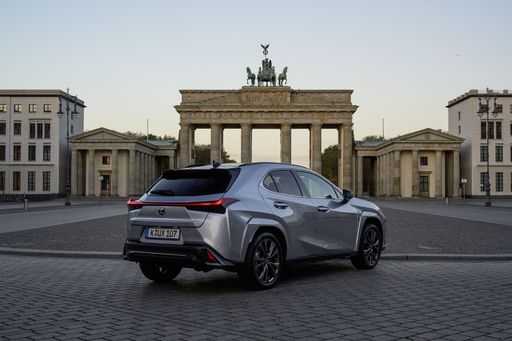 @ toyota-media.de
@ toyota-media.de
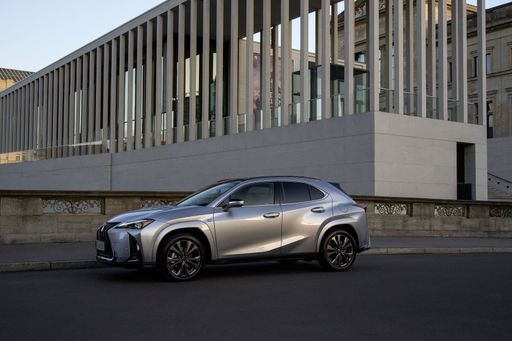 @ toyota-media.de
@ toyota-media.de
 @ toyota-media.de
@ toyota-media.de
Peugeot 2008
The Peugeot 2008 stands out in the compact SUV market with its blend of striking design and practical functionality. It offers a comfortable ride with a sophisticated interior that exudes quality, making it ideal for both urban commutes and longer journeys. The model's efficient performance and range of modern features further enhance its appeal to a diverse range of drivers.
details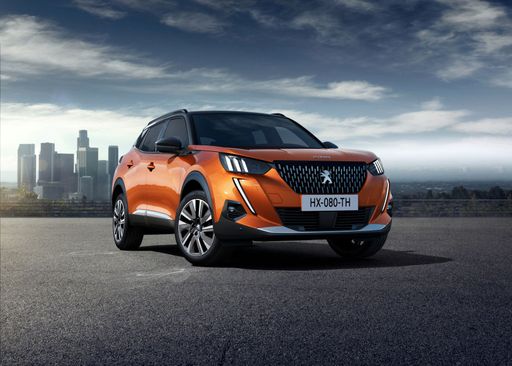 @ media.stellantis.com
@ media.stellantis.com
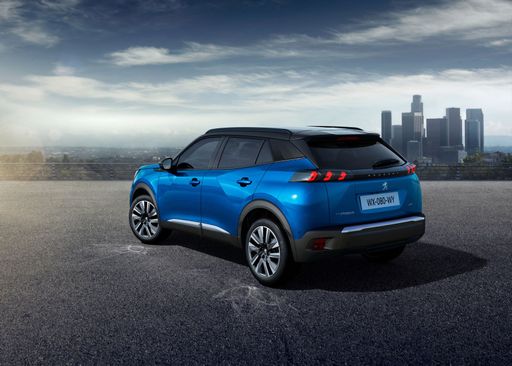 @ media.stellantis.com
@ media.stellantis.com
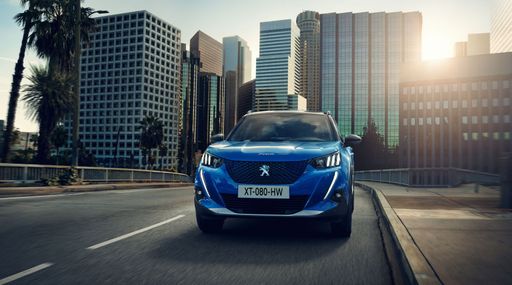 @ media.stellantis.com
@ media.stellantis.com
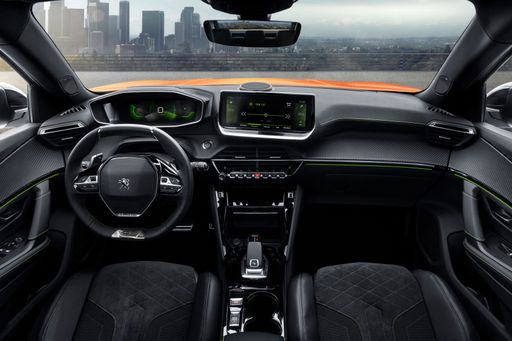 @ media.stellantis.com
@ media.stellantis.com

|

|
|
|
|
Costs and Consumption |
|
|---|---|
|
Price
37900 - 54100 £
|
Price
24500 - 40300 £
|
|
Consumption L/100km
5 - 5.6 L
|
Consumption L/100km
5 - 6.2 L
|
|
Consumption kWh/100km
-
|
Consumption kWh/100km
15.50 kWh
|
|
Electric Range
-
|
Electric Range
406 km
|
|
Battery Capacity
-
|
Battery Capacity
51 kWh
|
|
co2
113 - 127 g/km
|
co2
0 - 140 g/km
|
|
Fuel tank capacity
43 L
|
Fuel tank capacity
44 L
|
Dimensions and Body |
|
|---|---|
|
Body Type
SUV
|
Body Type
SUV
|
|
Seats
5
|
Seats
5
|
|
Doors
5
|
Doors
5
|
|
Curb weight
1495 - 1555 kg
|
Curb weight
1263 - 1623 kg
|
|
Trunk capacity
283 - 320 L
|
Trunk capacity
434 L
|
|
Length
4495 mm
|
Length
4304 mm
|
|
Width
1840 mm
|
Width
1770 mm
|
|
Height
1540 mm
|
Height
1523 mm
|
|
Max trunk capacity
1194 - 1231 L
|
Max trunk capacity
1467 L
|
|
Payload
555 - 615 kg
|
Payload
407 - 460 kg
|
Engine and Performance |
|
|---|---|
|
Engine Type
Full Hybrid
|
Engine Type
Petrol, Electric, Petrol MHEV
|
|
Transmission
Automatic
|
Transmission
Manuel, Automatic
|
|
Transmission Detail
CVT
|
Transmission Detail
Manual Gearbox, Reduction Gearbox, Automatic Gearbox, Dual-Clutch Automatic
|
|
Drive Type
Front-Wheel Drive, All-Wheel Drive
|
Drive Type
Front-Wheel Drive
|
|
Power HP
199 HP
|
Power HP
101 - 156 HP
|
|
Acceleration 0-100km/h
7.9 - 8.1 s
|
Acceleration 0-100km/h
8.3 - 10.9 s
|
|
Max Speed
177 km/h
|
Max Speed
150 - 206 km/h
|
|
Torque
-
|
Torque
205 - 270 Nm
|
|
Number of Cylinders
4
|
Number of Cylinders
3
|
|
Power kW
146 kW
|
Power kW
74 - 115 kW
|
|
Engine capacity
1987 cm3
|
Engine capacity
1199 cm3
|
General |
|
|---|---|
|
Model Year
2025
|
Model Year
2023 - 2025
|
|
CO2 Efficiency Class
C, D
|
CO2 Efficiency Class
D, A, E, C
|
|
Brand
Lexus
|
Brand
Peugeot
|
Is the Lexus UX offered with different drivetrains?
Available configurations include Front-Wheel Drive or All-Wheel Drive.
The prices and data displayed are estimates based on German list prices and may vary by country. This information is not legally binding.
